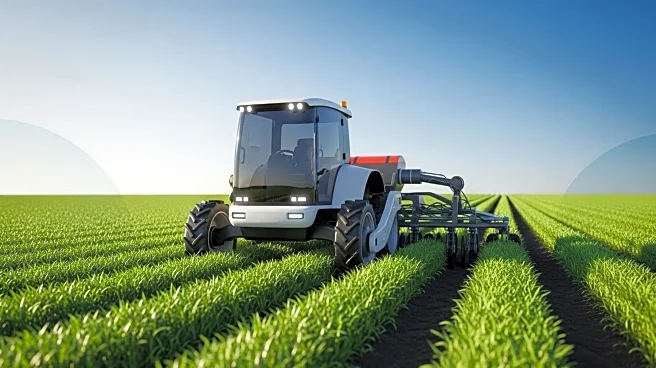What's Happening?
John Deere has announced the acquisition of GUSS Automation, an autonomous orchard sprayer company. GUSS, which stands for Global Unmanned Spray System, was founded in 2018 and aims to provide solutions to the agricultural labor shortage. The sprayers are designed to apply fungicides, fertilizers, and pesticides to various types of trees, including pistachio, almond, citrus, and fruit trees. A single operator can remotely monitor up to eight sprayers simultaneously from their vehicle. This acquisition follows a joint venture formed between John Deere and GUSS three years ago, during which they introduced the Electric GUSS at the World Ag Expo in February 2024.
Why It's Important?
The acquisition of GUSS Automation by John Deere is significant as it addresses the ongoing labor shortages in the agricultural sector. By utilizing autonomous technology, John Deere aims to enhance efficiency and reduce dependency on manual labor, which is increasingly scarce. This move could potentially lead to increased productivity and lower operational costs for farmers, thereby impacting the agricultural industry positively. Additionally, the integration of GUSS's technology with John Deere's existing infrastructure could lead to further innovations in precision agriculture, benefiting both companies and their customers.
What's Next?
Following the acquisition, John Deere dealers will continue to sell and service GUSS sprayers, while GUSS will maintain its name, employees, branding, and independent manufacturing plant in Kingsburg, California. The sprayers, which already feature John Deere engines, will likely see further development and integration with John Deere's agricultural machinery. The continued deployment of GUSS's technology, which uses proprietary software, LiDAR, GPS, and vehicle sensors, is expected to expand globally, potentially increasing the number of machines in operation.
Beyond the Headlines
The acquisition highlights the growing trend of automation in agriculture, which raises questions about the future of farm labor and the ethical implications of replacing human workers with machines. While automation can lead to increased efficiency, it also necessitates a shift in workforce skills, requiring workers to adapt to new technologies. This development may prompt discussions on the need for training programs to equip workers with the necessary skills to operate and manage automated systems.










